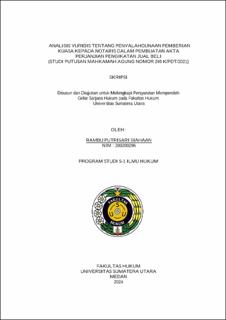| dc.description.abstract | Notaries are closely related to legal documents or authentic deeds that are directly related to the community. The role of a Notary is to be a witness by checking the identity of the parties and must ensure that the legal acts carried out are in accordance with applicable provisions. The discussion in this thesis focuses on the misuse of making an agreement carried out by a Notary in making a Sale and Purchase Agreement (PPJB) deed. The topic of writing this thesis aims to determine the substance of the regulations and types in making a sale and purchase agreement deed made before a Notary, analyzing the legal consequences and considerations of the Judge regarding the case of misuse of power of attorney in making a sale and purchase agreement deed before a Notary against the Supreme Court Decision Number 249 K / Pdt / 2021.
The method used in writing this thesis is the normative legal method using a statute approach and an approach to the case. The data sources used come from secondary data consisting of primary, secondary, and tertiary legal materials. The technique of data collection uses library research with the intention of collecting and studying the topics of discussion from law books, scientific papers, scientific law journals, similar laws and regulations, to other readings that have a legal relationship with the writing of this thesis.
The regulation regarding the type of granting of power in making a deed of agreement is guided by Articles 39 and 40 of the UUJN which explain that its implementation is carried out before a Notary who is attended in fact by the parties and 2 (two) witnesses. The form of granting power is divided into 3 (three) ways, namely granting power verbally, granting power in writing, and granting power secretly. The legal consequences arising from the misuse of power in making a deed of sale and purchase are that the deed can be canceled because it does not meet the subjective requirements in Article 1320 of the Civil Code. In conclusion, the Notary in the discussion of this thesis has committed an act of abuse of power by making a deed that does not explain the truth of the facts of the event and violates the legal requirements in making a deed of agreement. In its legal considerations, the Panel of Judges only paid attention to errors in the contents of the Plaintiff's lawsuit without paying attention to and deciding on important aspects of the main problem, namely the validity of the agreement and the legal relationship between the disputing parties. | en_US |


